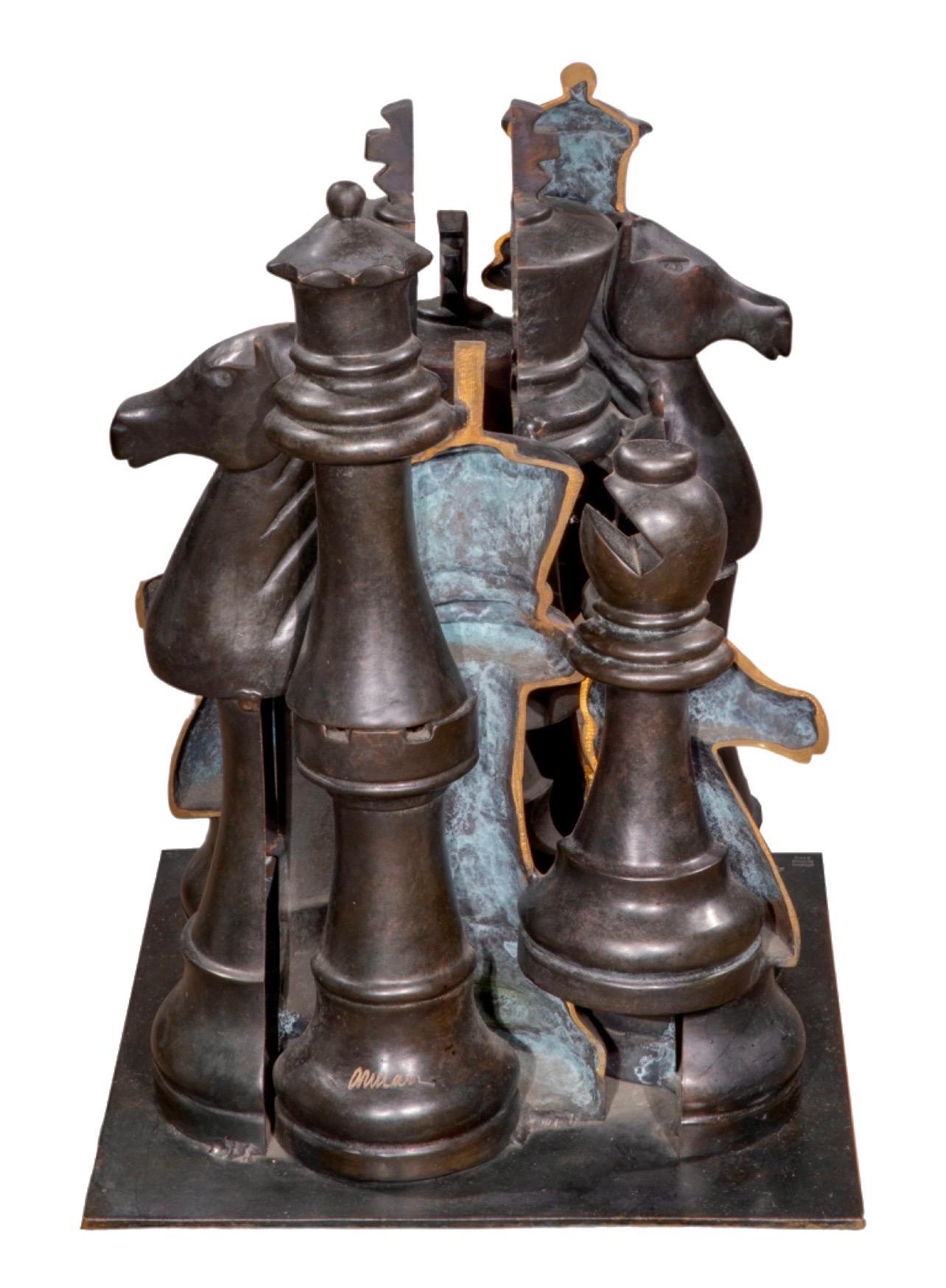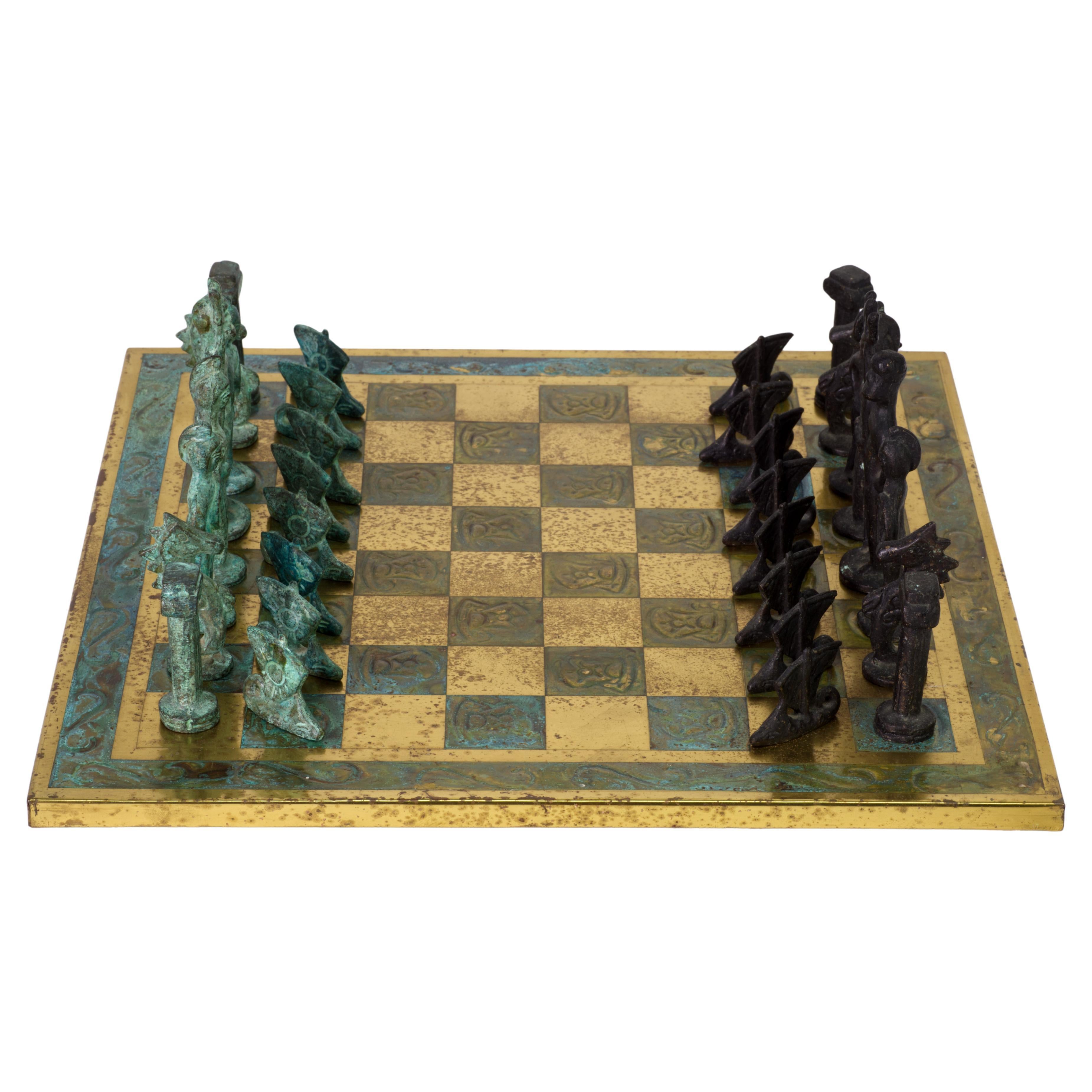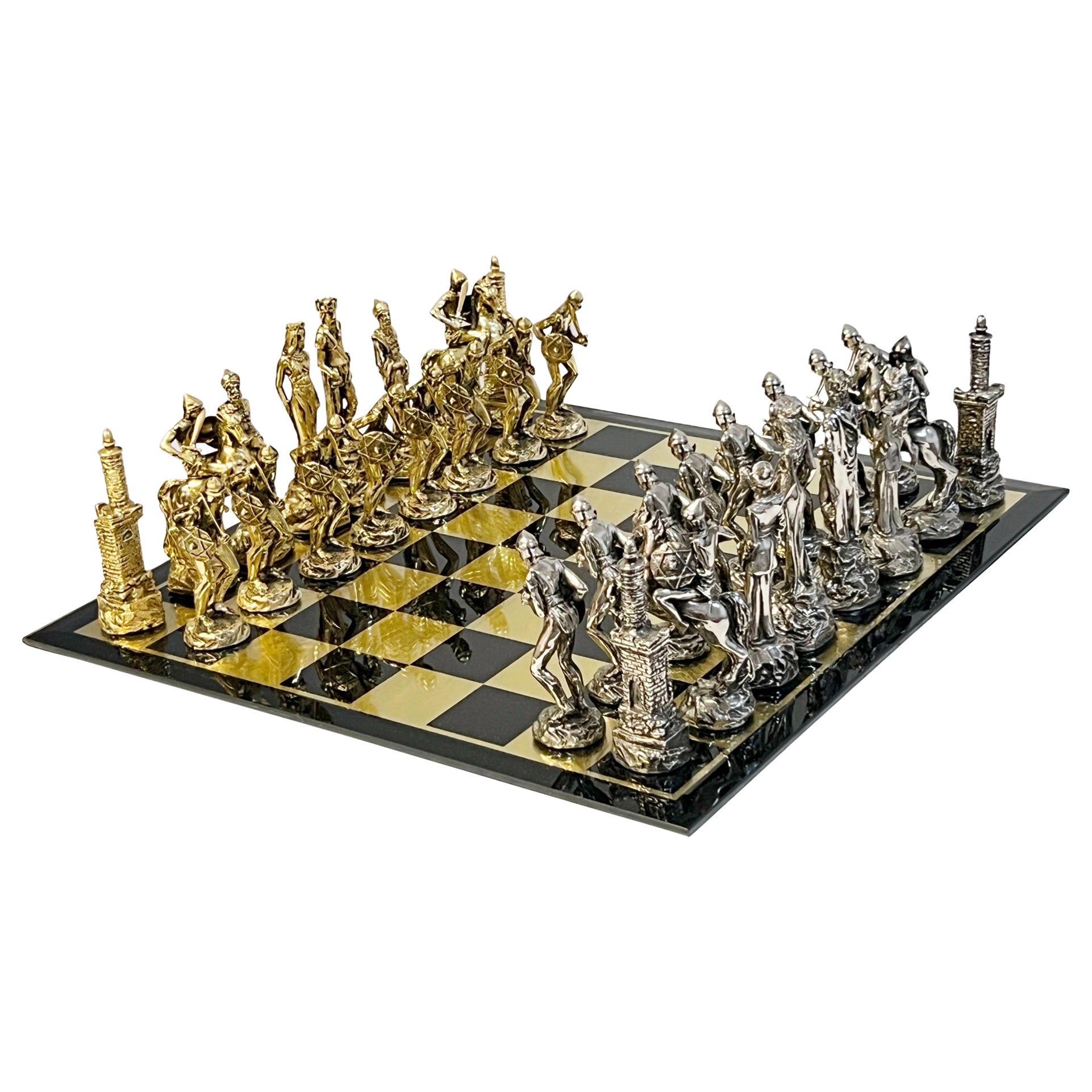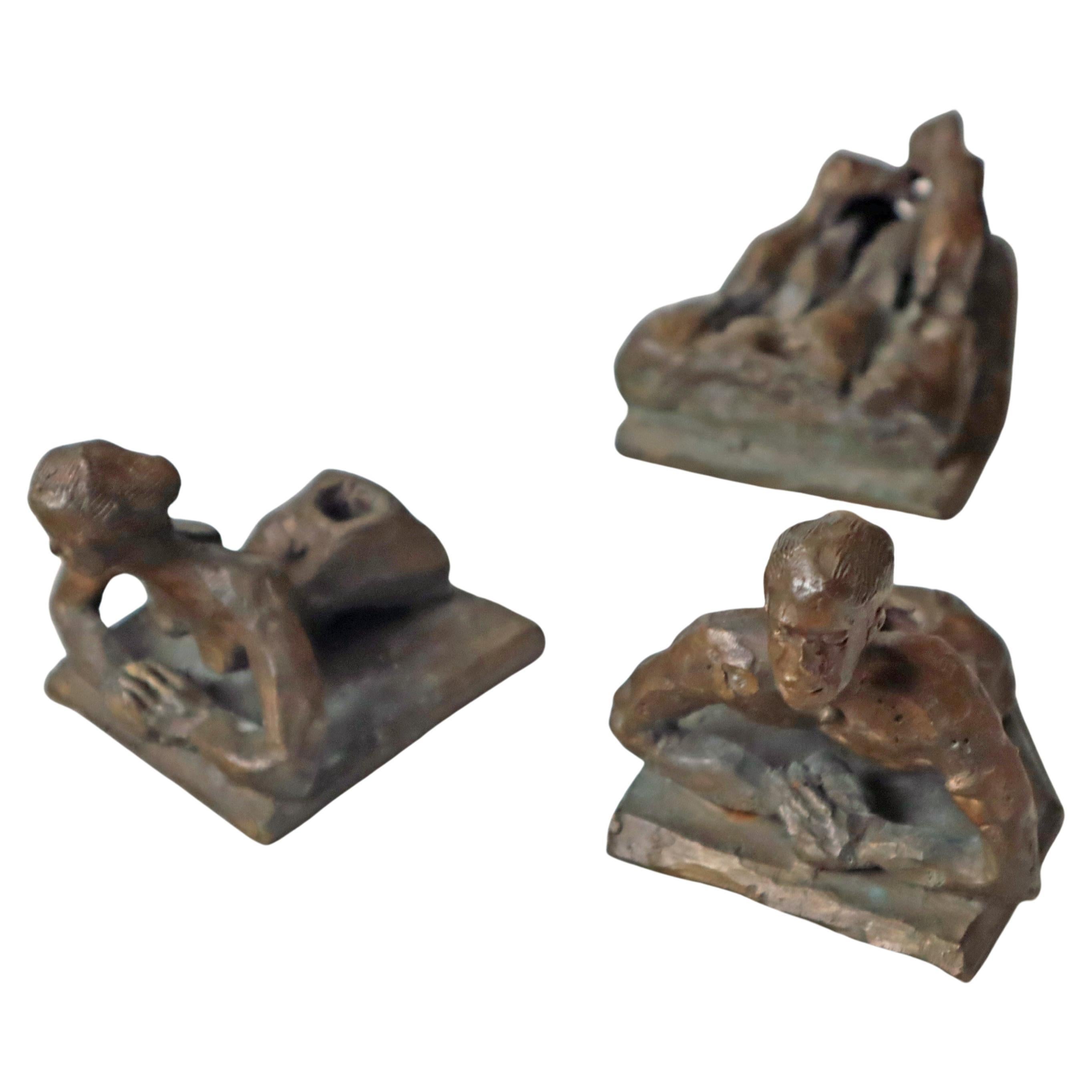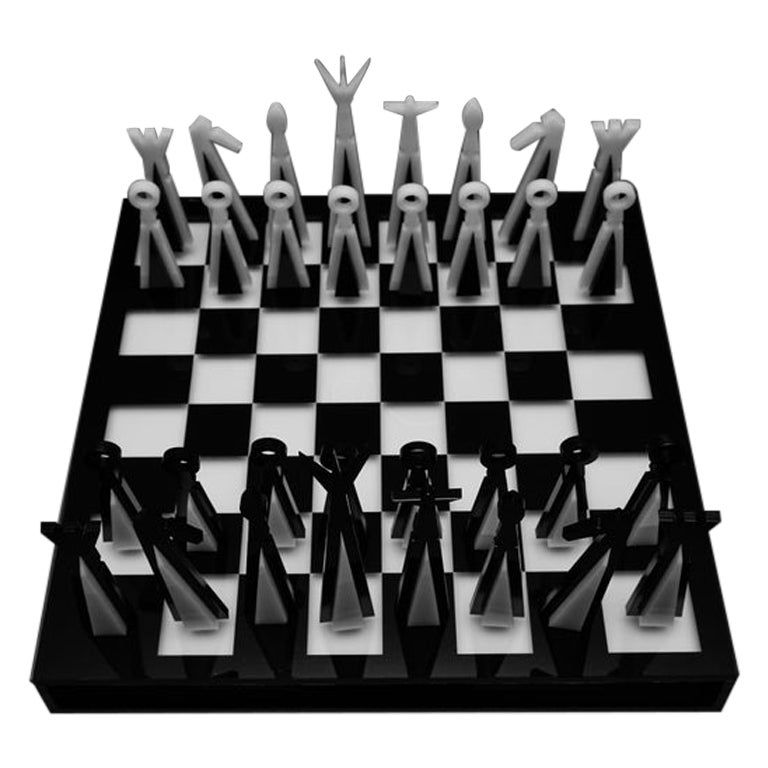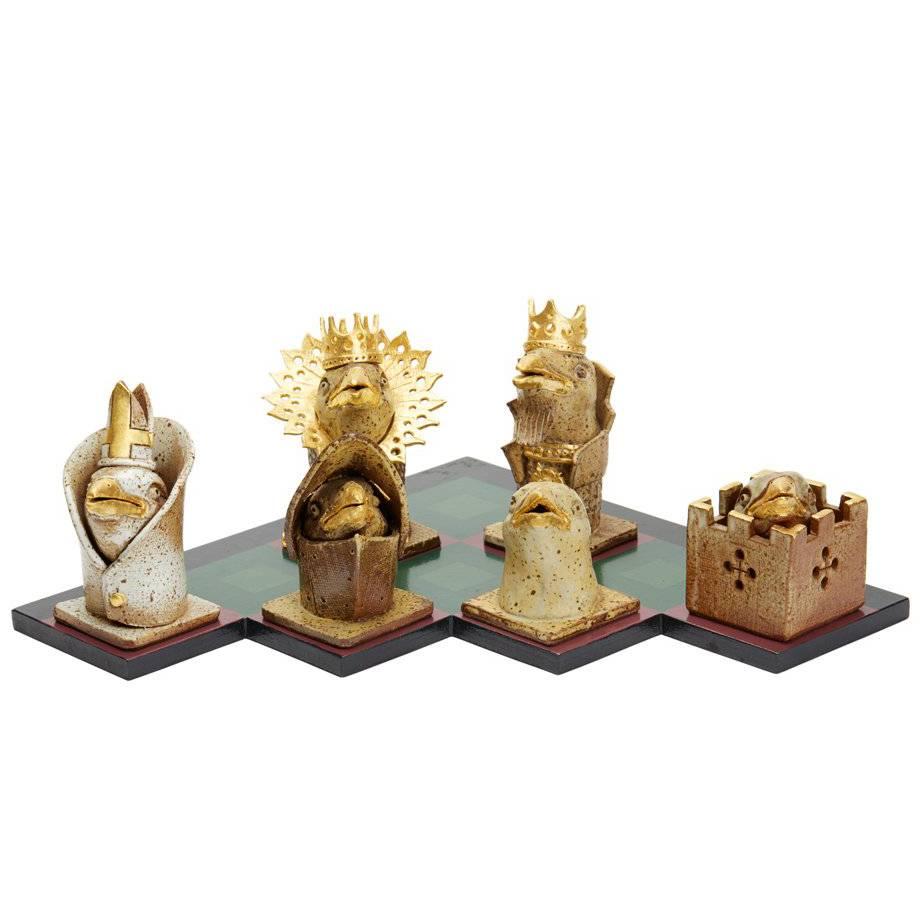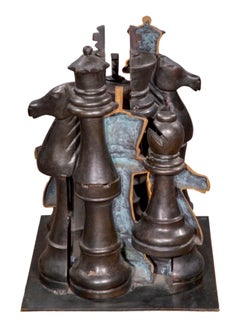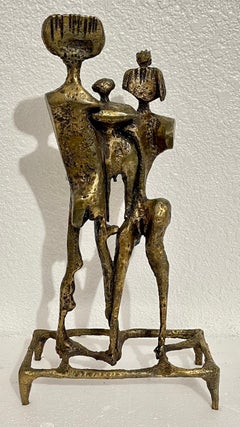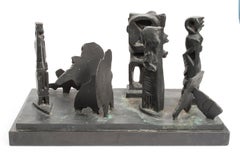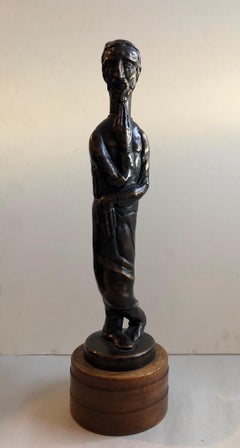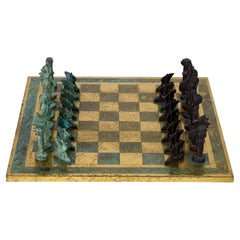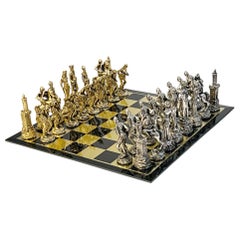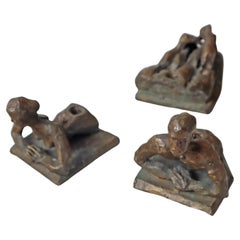Items Similar to Liberty vs Slavery Van Loen Bronze Abstract Chess Set Modernist Museum Sculpture
Want more images or videos?
Request additional images or videos from the seller
1 of 8
Alfred Van LoenLiberty vs Slavery Van Loen Bronze Abstract Chess Set Modernist Museum Sculpturec.1960's
c.1960's
$18,000
£13,665.29
€15,630.18
CA$25,148.61
A$27,970.74
CHF 14,605.45
MX$340,374.20
NOK 186,533.93
SEK 174,935.92
DKK 116,654.02
Shipping
Retrieving quote...The 1stDibs Promise:
Authenticity Guarantee,
Money-Back Guarantee,
24-Hour Cancellation
About the Item
Alfred Van Loen signed 32 piece chess set. In heavy solid bronze.
Rare Chess Game: Liberty versus Slavery
Dimensions:
a) Joy-Tenderness H. 6 3/16 in. aa) Bondage H. 5 5/16 in.
b) Play-Security H. 5 5/8 in. bb) Strangulation H. 5 7/8 in.
c) The Scholar H. 7 5/8 in. cc) Hurt Helpless H. 7 in.
d) The United Family H. 10 7/8 in. dd) Prisoner-Imprisoned H. 10 1/4 in.
e) Peace-Freedom H. 9 3/4 in. ee) Nurse-Pity H. 8 5/8 in.
f) Laborer H. 7 5/8 in. ff) Hopeless-Damaged H. 7 in.
g) Game-Confidence H. 5 3/4 in. gg) Brutality-Cruelty H. 6 1/4 in.
h) Pride-Protection H. 6 in. hh) Chained H. 5 in.
i) Drummer H. 4 1/16 in. ii) Wounded H. 4 1/4 in.
j) Clarinetist H. 5 3/4 in. jj) Sick H. 4 9/16 in.
k) Cellist H. 4 3/4 in. kk) Crushed H. 4 3/8 in.
l) Accordionist H. 4 1/2 in. ll) Hopeless H. 4 7/16 in.
m) Cymbal Player H. 4 1/2 in. mm) Beggar H. 3 15/16 in.
n) Guitarist H. 4 11/16 in. nn) Despair H. 4 5/16 in.
o) Harpist H. 4 in. oo) Cripple H. 4 9/16 in.
p) Violinist H. 4 5/16 in. pp) Blind H. 4 5/16 in.
This set is in the permanent collection of the Metropolitan Museum of Art in New York City
and the Israel Museum in Jerusalem. It speaks to the horrors of slavery and the joys of freedom.
it was created during the civil rights movement and while his personal history was of the horrors of World War II, I believe this might also reference the African American experience.
Alfred Van Loen was a prolific artist whose career spanned a half century. He was born in 1924 in Oberhausen-Osterfeld, Germany and sent to Holland to be educated. He graduated from the Royal Academy of Amsterdam. He immigrated to the United States following World War II and taught art at Vassar, Hunter College and Columbia University. He taught at C.W. Post for over 20 years. His work is characterized by a spiritual connection to nature. Van Loen's reputation is built on his works as a direct carver a sculptor who carves into stone or marble without preliminary blueprints, models or drawings. Van Loen is a man in love with the materials. He is an artist who is part scientist, part architect, part explorer and part inventor. Van Loen further isolated himself from the cultural capital and "the sickness of the art world in New York City." Since then, Van Loen has become a bigger star in a smaller galaxy, with a devoted following of patrons and students. Whether casting medals, drawing in unbroken lines (similar to those of Pablo Picasso and Alexander Calder), painting in watercolors or carving stones and wood, Van Loen is the quintessential craftsman. The real Van Loen is in all of his work. He finds endless lines of continuity and form in the trees and birds and plants that surround him. His two lives. One begins in Germany, where he was born in 1924. The other picks up in 1947 when he arrived in New York. At age six, he says, his wealthy, Jewish parents Karl and Hedwig Lowenthal, owners of a sporting good store sent him to school at a Dominican cloister in Venlo, Holland. In 1938, forced to flee Nazi persecution in Germany, the family moved to Amsterdam, where Alfred joined them. A small carved crucifix which he produced caught the eye of a sponsor who enrolled him in the Royal Academy of Art in Amsterdam in 1941. Surrounded by the cruelty and destruction of war, the young artist became involved in the underground, spying and distributing anti-Nazi pamphlets. Betrayed by his best friend, he was arrested by the Nazi Gestapo and spent 16 months in Auschwitz. When he got out, he says, he had only 72 pounds distributed on his 6-foot, 2-inch frame. He did not expect to live after his recovery, he changed his family name, Lowenthal, to Van Loen and returned to the Royal Academy to finish the formal and classical training in anatomy, architectural drawing, pottery, carpentry and casting. By the time he graduated, the war was over, and he decided to come to the United States. When Van Loen talks about this part of his background, the details are sketchy, sometimes contradictory. He does not dwell on that period of his life, and he will not be pressed for specifics. "People should never forget the atrocities of that war," he says. "But they should not continue, living with the memories of it." There are happier memories of his life in the United States, which began April 4, 1947, when a rebuilt troop transport brought 800 emigrants, including the 22-year-old Van Loen, to New York. If there are any gaps in Van Loen's life as a U.S. citizen, they come in the early-1950s when he abandoned the Bohemian life of a young, promising New York artist and traveled to Mexico and briefly to Europe. In 1958, he married Helen Roberts (his second marriage ended in divorce and his first marriage, in pre-war Europe, is shrouded in mystery).
Alfred VAN LOEN (1924-1994) German/Dutch/American
Birth place: Oberhausen-Osterfeld, Germany
Profession: Sculptor, educator
Studied: Royal Acad. Art, Amsterdam, Holland, 1941-46.
Exhibited: PAFA Ann., 1950, 1954, 1960; NAD, 1964; WMAA,1957, 1967; Emil Walters Gal., NYC, 1968; Stony Brook Mus., 1968; Heckshere Mus., Huntington, NY, 1971; Harbor Gal., Cold Spring Harbor, NY, 1970s. Awards: first prize, Village AC, 1949; Louisa Robbins Award, Silvermine Guild Artists, 1956; first prize sculpture, Am. Soc. Contemporary Artists, 1964.
Member: AEA; Am. Soc. Contemp Artists; Am. Crafts Council; Long Island Univ. Pioneer Club; Huntington Artists Group.
Work: MMA; MoMA; Brooklyn Mus., NY; Nat. Mus., Jerusalem, Israel. Commissions: brass fountain, James White Community Center, Salt Lake City, UT, 1958; Peace Window, Community Church, New York, 1963; Crescendo, State Univ. NY Agric. & Tech. College Farmingdale, 1969; Jacob's Dream (brass), Little Neck Jewish Center, NY, 1970; bronze & acrylic portrait of Guy Lombardo, Hall of Fame, Stony Brook, NY, 1972.
Preferred media: stone, acrylic.
Publications: "Simple Methods of Sculpture," Channel Press, 1958; "Instructions to Sculpture," C.W. Post College, 1966;
"Origin of Structure and Design," Hamilton Press, 1967;
"Drawings by Alfred Van Loen," Harbor Gallery Press, 1969.
Teaching: instructor, Hunter College, 1953-54
instructor, North Shore Community ACr., NY, 1955-61;
asst. professor sculpture, C.W. Post College, Long Island Univ., 1962-.
- Creator:Alfred Van Loen (1924 - 1994, American)
- Creation Year:c.1960's
- Dimensions:Height: 21.5 in (54.61 cm)Width: 7 in (17.78 cm)
- Medium:
- Movement & Style:
- Period:
- Condition:
- Gallery Location:Surfside, FL
- Reference Number:1stDibs: LU38215341682
About the Seller
4.9
Platinum Seller
Premium sellers with a 4.7+ rating and 24-hour response times
Established in 1995
1stDibs seller since 2014
1,784 sales on 1stDibs
Typical response time: <1 hour
- ShippingRetrieving quote...Shipping from: Surfside, FL
- Return Policy
Authenticity Guarantee
In the unlikely event there’s an issue with an item’s authenticity, contact us within 1 year for a full refund. DetailsMoney-Back Guarantee
If your item is not as described, is damaged in transit, or does not arrive, contact us within 7 days for a full refund. Details24-Hour Cancellation
You have a 24-hour grace period in which to reconsider your purchase, with no questions asked.Vetted Professional Sellers
Our world-class sellers must adhere to strict standards for service and quality, maintaining the integrity of our listings.Price-Match Guarantee
If you find that a seller listed the same item for a lower price elsewhere, we’ll match it.Trusted Global Delivery
Our best-in-class carrier network provides specialized shipping options worldwide, including custom delivery.More From This Seller
View AllFrench Pop Art Heavy Bronze Sculpture Chess Game Gambit Arman Accumulation
By Arman
Located in Surfside, FL
Arman, French American (1928-2005)
Gambit (Chess pieces)
Cast Bronze Sculpture with patina
Incised signature near lower edge, 48/70 with
impressed "Bronze Romain & Fils" foundry ma...
Category
Early 2000s Abstract Figurative Sculptures
Materials
Bronze
Large Aharon Bezalel Israeli Modernist Bronze Brutalist Puzzle Sculpture Figures
By Aharon Bezalel
Located in Surfside, FL
Aharon Bezalel (Afghani-Israeli, 1925-2012)
Family Grouping
Hand signed in with initials in English
Figures fit together like puzzle pieces in solid cast bronze with original patina.
Aharon Bezalel (born Afghanistan 1926) Born in Herat, Afghanistan in 1926 and immigrated to Israel at an early age. His father, Reuven Bezalel, was a rabbi and kabbalist. As a youth Aharon studied gold and silver casting as well as applied arts and worked in these fields as a silversmith and judaica craftsman, and was a student of the sculptor Zev Ben-Zvi at the Bezalel Academy for Art & Design where he also studied with Isidor Ascheim and Mordecai Ardon. There he absorbed the basic concepts of classic and modernist art and interpreted, according to them, ideas based on ancient Hebrew sources. He also studied miniature carving with the artists Martin and Helga Rost applying himself at their workshop. Aharon Bezalel worked and resided in Jerusalem, he taught art for many years. His sculptures - works of wood, bronze, aluminum, Plexiglas - were shown at his studio in Ein Kerem. “I saw myself as part of this region. I wanted to find the contact between my art and my surroundings. Those were the first years of Jean Piro’s excavations at the Beer-Sheba mound. They found there, for example, the Canaanite figurines that I especially liked and that were an element that connected me with the past and with this place.” “…a seed and sperm or male and female. These continue life. The singular, the individual alone, cannot exist; I learned this from my father who dabbled with the Kabbalah.”
(Aharon Bezalel, excerpt from an interview with David Gerstein)
“The singular in Aharon Bezalel’s work is always potentially a couple if not a threesome, the one is also the many: when the individual is revealed within the group he will always seek a huddling, a clinging together.
The principle of modular construction is required by this perception of unity and multiplicity, as modular construction in his work is an act of conception or defense. His work bears a similarity to Berrocal as well as affinities to Henry Moore, Lynne Chadwick and Kenneth Armitage. Two poles of unity, potentially alone, exist in A. Bezalel’s world: From a formal, sculptural sense these are the sphere and pillar, metaphorically these are the female in the final stages of pregnancy and the solitary male individual. Sphere-seed-woman; Pillar-strand-man. The disproportional, small heads in A. Bezalel figures leave humankind in it’s primal physical capacity. The woman as a pregnancy or hips, the man as an aggressive or defensive force, the elongated chest serves as a phallus and weapon simultaneously.
(Gideon Ofrat)
EIN HAROD About the Museum's Holdings: Israeli art is represented by the works of Reuven Rubin, Zaritzky, Nahum Gutman...
Category
Mid-20th Century Expressionist Abstract Sculptures
Materials
Bronze
Brutalist Modern Abstract Bronze Sculpture Metropolis Manner of Louise Nevelson
By Abbott Pattison
Located in Surfside, FL
A very heavy, massive bronze sculpture by an important Chicago sculptor. Signed and marked "Firenze" with "Fuse Marinelli". METROPOLIS. Seven abstract shapes on black marble base. 1...
Category
20th Century Modern Abstract Sculptures
Materials
Marble, Bronze
Art Deco Expressionist Bronze Judaica Rabbi Sculpture Los Angeles Modernist
By Peter Krasnow
Located in Surfside, FL
Bronze Jewish Rabbi. Original Patina. Art-deco wood carved base. It is signed with initials P.K. and marked "Calif Art Bronze Fdry LA" (California Art Bronze Foundry Los Angeles). it is not dated.
PETER KRASNOW (1886-1979), Russian-Ukrainian, American artist painter and sculptor, born Feivish Reisberg, was a California modernist and colorist artist known for his abstract wood sculptures and architectonic hard-edge paintings and drawings which were often based on Hebrew calligraphy and other subjects related to his Jewish heritage...
Category
1930s Expressionist Figurative Sculptures
Materials
Bronze
Rare Chaim Goldberg Kaszmirez Polish Modernist Memorial Sculpture Spertus Museum
By Chaïm Goldberg
Located in Surfside, FL
Deaccessioned from the Spertus Museum in Chicago
Hand signed by artist in wood carving
Chaim Goldberg -- born in the Polish shtetl of Kazimierz Dolny
Chaim Goldberg has worked in ne...
Category
Mid-20th Century Expressionist Figurative Sculptures
Materials
Wood
Rare Aharon Bezalel Israeli Gilt Modernist Bronze Sculpture Suite
By Aharon Bezalel
Located in Surfside, FL
The width dimensions are variable. the tallest height is 11.5 inches. Family group. A suite of three bronze sculptures.
Aharon Bezalel (born Afghanistan 1926) Born in Afghanistan in 1926 and immigrated to Israel at an early age. As a youth was engaged as a silversmith and craftsman, and was a student of the sculptor Zev Ben-Zvi from whom he absorbed the basic concepts of classic and modernist art and interpreted, according to them, ideas based on ancient Hebrew sources.
Aharon Bezalel works and resides in Jerusalem, he taught art for many years.
“I saw myself as part of this region. I wanted to find the contact between my art and my surroundings. Those were the first years of Jean Piro’s excavations at the Beer-Sheba mound. They found there, for example, the Canaanite figurines that I especially liked and that were an element that connected me with the past and with this place.” “…a seed and sperm or male and female. These continue life. The singular, the individual alone, cannot exist; I learned this from my father who dabbled with the Kabbalah.”
(Aharon Bezalel, excerpt from an interview with David Gerstein)
“The singular in Aharon Bezalel’s work is always potentially a couple if not a threesome[…] the one is also the many: when the individual is revealed within the group he will always seek a huddling, a clinging together.
The principle of modular construction is required by this perception of unity and multiplicity, as modular construction in his work is an act of conception or defense.
Two poles of unity, potentially alone, exist in A. Bezalel’s world: From a formal, sculptural sense these are the sphere and pillar, metaphorically these are the female in the final stages of pregnancy and the solitary male individual. Sphere-seed-woman; Pillar-strand-man. The disproportional, small heads in A. Bezalel’s figures leave humankind in it’s primal physical capacity. The woman as a pregnancy or hips, the man as an aggressive or defensive force, the elongated chest serves as a phallus and weapon simultaneously.
(Gideon Ofrat)
EIN HAROD About the Museum's Holdings: Israeli art is represented by the works of Reuven Rubin, Zaritzky, Nahum Gutman, Mordechai Ardon, Aharon Kahana, Arie Lubin, Yehiel Shemi, Yosl Bergner and others.
The graphic arts collection contains drawings and graphic works by Pissaro, Modigliani, Pascin, Chagall (almost all of his graphic work), and numerous other artists. The sculpture collection includes works by Jewish sculptors from all over the world including leading Israeli sculptors; Ben Zvi, Lishansky, David Palombo, Yehiel Shemi, Aharon Bezalel and Igael Tumarkin.
Many Jewish sculptors from all parts of the world, beginning with Antokolski, are represented in the collection. In the sculpture courtyard there are works by Chana Orloff, Jacob Epstein (the works he bequeathed to the Museum), Glicenstein, Loutchansky, Constant and Indenbaum from Western Europe; Glid from Yugoslavia; Zorach, Gross and Harkavy from the United States; and most of the outstanding sculptors of Israel : Ben-Zvi, Lishansky, Ziffer, Lehmann, Feigin, Sternschuss, Palombo ( who executed the iron gate...
Category
1970s Expressionist Abstract Sculptures
Materials
Bronze
You May Also Like
1960S Italian Chess set in Patinated Bronze.
Located in Clifton Springs, NY
Striking Italian bronze chess set was modeled after Etruscan bronze sculptures produced in the Umbro-Sabellian area around the 5th century BC. The figures are fully armored and read...
Category
Mid-20th Century Italian Brutalist Game Boards
Materials
Brass, Bronze
Yaacov Heller Sculptural Chess Set King David and Bathsheba
Located in Miami, FL
Spectacular chess set by Yaacov Heller. The sculptures are silver and gold over cast pewter. Fine detail. All pieces are signed. Retains original glass board.
Category
1990s American Games
Materials
Gold, Silver, Pewter
Surrealist bronze sculpture act of female and male signed candle holders , 1980
Located in Hannover, DE
unusual, abstract bronzes of female and male acts. The three individual Brone parts can each be equipped with a small candle. Below the plate there are mysterious numbers and symbols...
Category
Vintage 1980s Modern Figurative Sculptures
Materials
Bronze
Chess / Silvino Lopeztovar
By Silvino Lopeztovar
Located in COYOACAN, DF
Silvino Lopeztovar
Born in Tlahuelilpan, Hidalgo, Mexico in 1970, Silvino Lopeztovar finished his professional design studies at the Universidad Nuevo Mundo in 1994. After his bachel...
Category
21st Century and Contemporary Mexican Other Abstract Sculptures
Materials
Acrylic
Kenneth Breeze Studio Pottery Chess Sculpture Installation
By Kenneth Breeze
Located in Bishop's Stortford, Hertfordshire
An unusual and stylish Kenneth Breeze Studio Pottery chess pieces and board sculptural installation comprising of six chess pieces and a hand-painted cut-out board. The chess pieces ...
Category
Early 2000s Modern Animal Sculptures
Materials
Pottery
20th Century Sculptural Italian Chess Game
By Arval Argenti Valenza
Located in VALENZA, IT
Brass chess board and chess game made with the ancient casting technique.
After casting, the finish was chiseled and subsequently silvered and finished with 24-carat gold plating.
The figures are in Florentine medieval style then painted with antioxidant treatment using a special transparent lacquer.
The two-tone mirrored glass chess top which highlights the high quality of execution.
Italian silverware, already with a centuries-old tradition, had a great development in the twentieth century and produced pieces of the highest quality that the whole world envies. Italian craftsmanship had a kind of new Renaissance after the war.
A great many high-quality silverware was born where exceptional pieces were produced that now decorate the most prestigious houses.
Made entirely by hand in the artisan workshop of piero Benzoni...
Category
Vintage 1980s Medieval Sheffield and Silverplate
Materials
Silver Plate
$5,703 Sale Price
20% Off
More Ways To Browse
Church Sculpture
Foot Sculpture Bronze
Bronze Sculpture Tree
White Bird Sculpture
Chess Art
S 10 K
Bronze Architectural Model
Chess Sets
Abstract Sculpture White Marble
Mexican Marble Sculptures
Bronze Tree Of Life
6 Foot Sculpture
1958 Pottery
Modernist Wood Carved Sculpture
Brass Foot Sculpture
Vintage Chess Set
J Bird Vintage
Bronze Hunter
